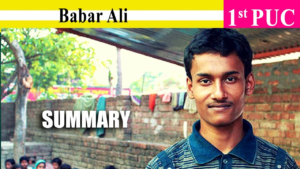1st PUC English Question and Answer – Babar Ali
Looking for 1st PUC English textbook answers? You can download Chapter 6: Babar Ali Questions and Answers PDF, Notes, and Summary here. 1st PUC English solutions follow the Karnataka State Board Syllabus, making it easier for students to revise and score higher in exams.
Karnataka 1st PUC English Textbook Answers—Reflections Chapter 6
Babar Ali Questions and Answers, Notes, and Summary
1st PUC English Chapter 6
Babar Ali
Scroll Down to Download Babar Ali PDF Notes
Babar Ali Comprehension I:
Question 1.
Where does Babar Ali run classes for poor children?
Answer:
Babar Ali runs classes for poor children at Gangapur village in West Bengal’s Murshidabad.
Question 2.
How is Babar Ali’s routine described by the writer?
Answer:
Babar wakes up every morning at 7 and starts his day by doing some household chores. Then he takes an auto rickshaw first and later walks five kilometres to the Cossi bazaar Raj Govinda Sundari Vidyapeeth where he is a class XII student. Babar makes his way to an afternoon school where he is the headmaster of a school of 800 students.
Question 3.
Give a picture of Babar Ali’s school.
Answer:
This is where rows of poor, underprivileged kids sit under the open, blue sky and learn what most children in the modem world pay hundreds of dollars for, for free. This is where 800 kids who are deprived of their basic right to education, walk miles to learn, free of cost, the fundamentals of life. In the Bhapta neighbourhood of Gangapur Village in West Bengal’s Murshidabad, Babar lives with his three siblings and his parents in a thatched house which is the size of an average city kitchen.
Even though their community provides free education to children, sending children to school is not entirely free of cost. Although the children are taught for free, they still have to pay for uniforms, books etc.
That is why a lot of families cannot afford to send their children to school. Thus, instead of going to school most of the boys help out their families by working as mechanics, day labourers, grass cutters, livestock herders etc; whereas girls work as maid servants in the village where they cook, clean, wash clothes and do dishes for their employers. Babar Ali wanted to change this. That is why he took the initiative of opening his very own school.
Question 4.
Why is Babar Ali called ‘a fortunate soul’ in his village?
Answer:
Babar Ali is called ‘a fortunate soul’ in his village. In the Bhapta neighborhood of Gangapur village in West Bengal’s Murshidabad, Babar lives with his three siblings and his parents in a thatched house which is the size of an average city kitchen.
Yet, he is still among the privileged ones in his village, because unlike most children there, he went to school and got formal education. He was better off also being the son of Nasiruddin Sheik.
Question 5.
What, according to Babar’s father, is true religion?
Answer:
Nasiruddin Sheikh, father of Babar, says that education is man’s true religion.
Question 6.
Why is sending children to school, a costly affair for parents?
Answer:
Even though children are provided free education, sending children to school is not entirely free of cost. Although the children are taught for free, they still have to pay for uniforms, books etc. That is why a lot of families cannot afford to send their children to school.
Question 7.
Tulu Rani Hazra is
(a) a widow.
(b) An illiterate educationist.
(c) A literate educationalist.
(d) A fishmonger.
Answer:
(d) A fishmonger.
Question 8.
The teaching staff of Babar Ali’s school is made up of…
(a) appointed teachers.
(b) High school student volunteers.
(c) Teachers from other schools.
(d) Teachers from Ali’s village.
Answer:
(b) High school student volunteers.
Question 9.
Babar Ali gets the children to listen by…
(a) Using the rod.
(b) Sparing the rod.
(c) Making friends with them,
(d) Taking advantage of the age gap.
Answer:
(c) Making friends with them.
Babar Ali Comprehension II:
Question 1.
Why do you think Babar Ali took the initiative to start his own school?
Answer:
Even though their community provides free education to children, sending children to school is not entirely free of cost. Although the children are taught for free, they still have to pay for uniforms, books etc. That is why a lot of families cannot afford to send their children to school.
Thus, instead of going to school most of the boys help out their families by working as
mechanics, day labourers, grass cutters, livestock herders etc; whereas girls work as maid servants in the village where they cook, clean, wash clothes and dishes for their employers. Babar Ali wanted to change this. That is why he took the initiative of opening his very own school.
Question 2.
‘What started as a game resulted in a much sought-after school for the unprivileged.’ Explain.
Answer:
Babar All started his school at the mere age of nine. His school “Anand Siksha Niketan” grew out of a game.
“We used to play school-school, with me as a teacher. My friends had never seen the inside of a school, so they enjoyed playing with students. They ended up learning arithmetic and enjoying it”, said Babar Ali while trying to explain, how he initially started teaching. In 2002, the game was institutionalized, with the strength of eight.
So gradually words spread and the numbers grew. Help began to come from other quarters: Babar’s own teachers, monks at the local Ramakrishna Mission, sympathetic IAS officers, and even local cops. When Babar first thought up a mid-day meal scheme, the rice came from his father’s fields, but now, with the aid of friends in the administration, it comes from government stock.
Question 3.
Do you think that Babar All’s act of thoughtfulness has enabled poor children to move towards growth? Discuss.
Answer:
Babar goes to school most of the boys help out their families by working as mechanics, day labourers, grass cutters, livestock herders etc; whereas girls work as maidservants in the village where they cook, clean, and wash clothes and dishes for their employers. Babar Ali wanted to change this.
That is why he took the initiative of opening his very own school. Babar makes his way to an afternoon school where he is the headmaster of a school of 800 students.
Babar Ali Comprehension III:
Question 1.
According to Nasiruddin ‘education is man’s true religion’. How does Babar All’s school prove this?
Answer:
Nasiruddin is a jute seller and a dropout who believes that education is man’s true religion, and who initially supported his son’s venture with his own income. Babar Ali started his school “Anand Siksha Niketan” at the mere age of nine.
In 2002, the game was institutionalized, with the strength of eight. So gradually word spread and the numbers grew. After nine years, the school has 60 regular attendees over 220 students on roll-call and 800 students in total, with 10 volunteer teachers teaching grades 1 through 8.
His little afternoon venture is now registered and recognized by the West Bengal State Government, which means students graduating from Babar’s school are eligible to be transferred to other local high schools. This shows that education is man’s true religion.
Question 2.
The increasing strength of Babar Ali’s school reflects the transformation in our society’s attitude towards education. Substantiate.
Answer:
Babar Ali gradually received help from his own teachers, monks at the local Ramakrishna Mission, sympathetic IAS officers, and even local cops. With the aid of friends in the administration, he got rice for the mid-day scheme from government stock.
His little afternoon venture is now registered and recognized by the West Bengal state Government, which means students graduating from Babar’s school are eligible to be transferred to other local high schools.
Question 3.
Do you feel that Babar Ali’s initiation is a success story? Explain.
Answer:
Yes, truly it is a great success for him. His story also bears evidence to the fact that if you have a well then there surely is a way. That a 9-year-old can also change the world should be enough inspiration for all of us to come out of our closed cocoons and help make a difference.
Coming from a small village in Murshidabad he should be commended just for the audacity of hoping. It is this hope and the faith that he has in himself that has helped him come all this way. It started as a game but now the world turned towards his school.
Babar Ali Summary
Babar Ali, an Indian student and teacher from Murshidabad in West Bengal, gained recognition as the “youngest headmaster in the world” at the age of sixteen. While still a student himself, enrolled at the government-run Raj Govinda school in Berhampore, West Bengal, Babar Ali took it upon himself to teach other children. In the afternoons, starting at 4:00 p.m., he founded a school in his parents’ backyard in Murshidabad.
This outdoor school, which currently has ten teachers (including Babar Ali), operates on a volunteer basis. All the teachers are students at school or college. The school provides free education to 800 children, starting from four or five years of age. Despite the economic challenges faced by the community, Babar Ali’s initiative has helped increase literacy rates in the area.
In Murshidabad, where there were no governmental or private schools, pupils travel up to four kilometers from nearby villages to attend lessons. Babar Ali’s efforts led to the school being recognized by local authorities, ensuring that its pupils receive the portion of free rice given to students at the end of each month by the government. His dedication to education and community empowerment is truly commendable! 🌟

